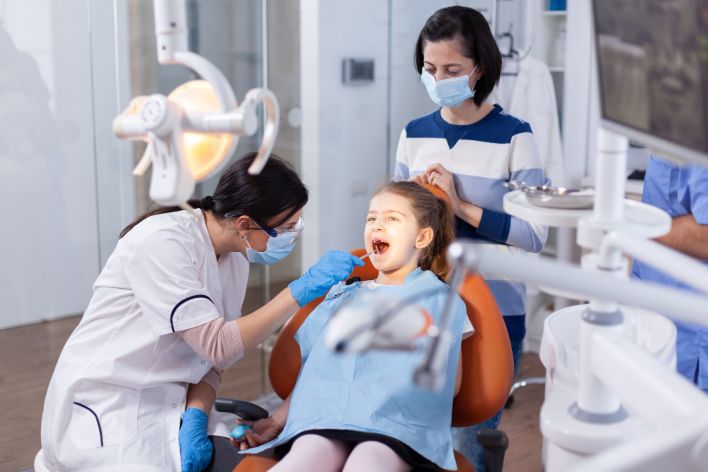Dental Health and Oral Hygiene
By Pinkey Sharma |
Date 08-08-2024

Table of Contents
- Introduction to Dental Health and Oral Hygiene
- Fundamentals of Oral Hygiene
- Common Dental Problems
- Advanced Dental Treatments
- Preventive Dental Care
- Nutrition and Oral Health
- The Role of Technology in Dental Health
- Oral Health for Different Life Stages
- The Connection Between Oral Health and Overall Health
- Tips for Maintaining Optimal Oral Health
- Conclusion
- Faqs
Admissions Open for
Dental hygiene and its importance, achievable through regular brushing, flossing among other measures are crucial components of general health. A healthy mouth does not only mean a perfect set of teeth; it is essential for the non-surgical treatment of dental diseases and body health. This detailed and comprehensive article will look at the significance of dental care, the technique of managing the mouth, teeth concern, and superior dental procedure.
Introduction to Dental Health and Oral Hygiene
Oral health on the other hand is the overall state of the person’s teeth, gums and the overall oral facial complex which enable the individual to smile, speak and chew. On the other hand, oral hygiene is the mastery and preservation of the mouth’s health through the mere processes of brushing, flossing and dental check-ups.
Importance of Dental Health
Oral health is an integral part of general health and quality of life. Poor dental hygiene can lead to various dental and medical problems, including gum disease, infection, loss of teeth, and even heart disease. Maintaining good oral hygiene is essential to avoid these issues and promote overall health.
Fundamentals of Oral Hygiene
Promising oral hygiene techniques are the cornerstones of maintaining good oral health and avoiding possible dental issues. These measures include proper brushing, flossing, and the use of a mouthwash, good diet and a routine dental check up.
Brushing
Brushing your teeth using a fluoride toothpaste forms the basis of care of the teeth and ought to be accomplished at least twice per day. The form of it aids in eradicating the build-up of the deposit referred to as plaque and is a thin layer of bacteria that forms on the teeth and gums. Proper brushing technique is also important.
-
Use a Soft-bristled Brush: Soft bristle toothbrush is mild on the gums and does a good job on cleaning teeth.
-
Brush for Two Minutes: Make sure that you move the brush across your teeth for at least 2 minutes with the brush getting to all sides of the mouth.
-
Angle Your Brush: When brushing, the angle with which you hold your toothbrush should be 45-degrees with your gums if you want to remove plaque.
-
Replace Your Toothbrush: Replace your toothbrush every 3-4 months or when the bristles are damaged or worn out.

Flossing
Flossing helps to clean in between the teeth and on the gum line which one can hardly reach by using a brush. Daily flossing is crucial for preventing gum disease and cavities, daily flossing is crucial for preventing gum disease and cavities.
-
Use About 18 Inches of Floss: Take about an inch or two of the floss and encircle your middle fingers with most of it, with some of the floss sticking out in front.
-
Guide the Floss Gently: Slide it in between and twist it around each single tooth and make a ‘C’ like motion with it.
-
Use Clean Sections: Do not use the same part of the floss for all your teeth as you could be spreading bacteria to the other teeth.
Mouthwash
Mouthwash can reach areas that brushing and flossing might miss. It helps reduce the amount of acid in the mouth, cleans hard-to-brush areas, and remineralizes the teeth.Mouthwash can reach areas that brushing and flossing might miss. It helps reduce the amount of acid in the mouth, cleans hard-to-brush areas, and remineralize the teeth.
-
Choose the Right Mouthwash: The mouth rinse selected for therapeutic use should be a fluoride containing mouth rinse with an added antimicrobial action.
-
Follow Instructions: Consume in the recommended measure and procedure as advised by your dentist or the product manufacturer.
Common Dental Problems
It is vital to comprehend the regular diseases affecting teeth for their prevention and eventual remedy. Here are some of the most prevalent issues:Here are some of the most prevalent issues:
Cavities (Tooth Decay):
Cavities are permanently affected zones in the enamel covering of your teeth which start to evolve into minute fissure-like approaches. They are a result of bacterial action in the mouth, the taking of snacks frequently, taking sweet produce like sugars and other related products, and lack of proper to and fro brushing. More than 530 million children suffer from tooth decay of primary teeth (milk teeth) as per FDI.
Prevention: This implies that cavities can be prevented through techniques such as brushing the teeth, flossing, administration of fluoride and ensuring that one takes a balanced diet.
Gum Disease (Periodontal Disease)
Gum disease is an inflammation of the tissues that support the teeth in your mouth. It is commonly due to inadequate personal care that include failure to brush and floss; plaque, which is a thin, sticky layer of bacteria, is formed on the teeth and calcifies. The FDI World Dental Federation states that this disease is among humanity’s most common diseases, affecting up to 50% of the global population.
Signs and Symptoms: Inflammation, reddening, bleeding, foul smell, and a tendency for the teeth to loosen up.
Prevention and Treatment: It is essential to always brush after meals, if that is not possible, then at least twice in a day apart from maintaining regular dental appointments. In severe cases, it may be necessary to clean deeply , prescribe some antibiotics, or even operate.
Oral Cancer
The location of oral cancer may be on the lips; the tongue, floor of mouth, cheeks, Hard and Soft Palate, sinuses and throat. Ideally, diagnosis should be done early to enhance the chances of the disease being treated. as per FDI, World Dental Federation, Oral cancer, which includes cancers of the lip, other parts of the mouth and the oropharynx (part of throat at the back of the mouth), is one of the 10 most common cancers, with an estimated 300-700 thousand new cases every year
Signs and Symptoms: Skin ulcers that do not heal, growths, rash or discoloration of the skin, bleed without any reason, having trouble chewing or swallowing.
Prevention: Oral cancer screening can be prevented by refraining from tobacco and alcohol, applying sunscreen on the lips, and going for dental check-ups.
Bad Breath (Halitosis)
Halitosis or the condition that causes one to have foul smelling breath is usually uncomfortable and sometimes a symptom of a disease. Common causes of bad breath include foods that people eat, bacteria, lack of saliva or other diseases and conditions related to the teeth and gums.
Prevention: Minimizing the frequency of brushing the teeth, drinking water and visiting the dentist can go a long way in controlling halitosis.
Advanced Dental Treatments
In some cases with regard to dental problems, specialized treatment will be required. These procedures are commonly more intricate and are conducted by practitioners.
Dental Implants
Dental implants are prosthetic tooth roots. These implants act as anchors that support the replacement teeth that can be either fixed or removable as per your specific requirements and the overall configuration of the teeth to be replaced.
-
Procedure: It is inserted in the jaw via a surgical procedure that has been practiced by surgeons for many years. After some time, it melds with the bone and gives firm anchorage to artificial teeth to be placed on.
-
Benefits: better looks, pronunciation, feeling, and status of the teeth.
Orthodontics
Corrective procedures like the ones which involve the use of braces or clear aligners in an orthodontist will assist in correcting the bad teeth and jaws.
-
Benefits: Esthetics, periodontal health, and function of the patient’s teeth.
-
Types: These are the types of orthodontic appliances; metal braces, ceramic braces, lingual braces and clear aligners such as the Invisalign.
Root Canal Treatment
The use of root canal treatment is to fill and restore a tooth that has been affected by decay or an infection.
-
Procedure: Pulp tissue, which has been damaged, is taken out and the interior of the tooth is smoothed and then filled.
-
Benefits: The treatment eliminates pain, preserves the natural tooth, and restores the appropriate functional abilities.
Crowns and Bridges
Crowns and bridges are fixed prosthetic devices that are cemented onto existing teeth or implants.
-
Crowns: Used to entirely cover or “cap” a damaged tooth or cover an implant.
-
Bridges: Used to replace one or more missing teeth by spanning the space where the teeth are missing.
Preventive Dental Care
Preventive care is the best way to maintain oral health and avoid costly and invasive treatments. It involves regular dental check-ups and cleanings, as well as maintaining good oral hygiene practices.
Regular Dental Check-ups
Regular visits to the dentist are essential for maintaining healthy teeth and gums. During these visits, the dentist will:
-
Perform a Thorough Cleaning: Removing plaque and tartar that regular brushing and flossing can't.
-
Conduct an Oral Examination: Checking for signs of cavities, gum disease, and other dental issues.
-
Take X-rays: If necessary, to get a detailed view of your teeth and jaws.
Fluoride Treatments
Fluoride is a natural mineral that strengthens teeth and prevents cavities. Dentists can apply fluoride treatments during check-ups to help protect teeth.
Dental Sealants
Dental sealants are thin, protective coatings applied to the chewing surfaces of the back teeth (molars) to prevent cavities.
Ideal for Children: Sealants are especially beneficial for children and teenagers, who are at higher risk for cavities.
Nutrition and Oral Health
A balanced diet is vital for dental health. What you eat and drink can significantly affect the health of your teeth and gums.
Foods That Promote Dental Health
- Dairy Products: Milk, cheese, and yogurt are rich in calcium and phosphates, which help strengthen teeth and bones.
- Fruits and Vegetables: Crunchy fruits and vegetables like apples, carrots, and celery stimulate saliva production, which helps cleanse the mouth.
- Nuts and Seeds: Nuts and seeds provide essential nutrients and healthy fats that support oral health.
Foods and Habits to Avoid
- Sugary Foods and Drinks: Excess sugar can lead to tooth decay. Avoid or limit sugary snacks, sodas, and candies.
- Acidic Foods and Drinks: Acidic foods and drinks, such as citrus fruits and sodas, can erode tooth enamel over time.
- Tobacco and Alcohol: Both can contribute to gum disease, oral cancer, and other dental problems. Avoiding tobacco and limiting alcohol consumption are crucial for oral health.
The Role of Technology in Dental Health
Advancements in technology have significantly impacted dental care, making treatments more effective and comfortable.

Digital X-rays
Digital X-rays use electronic sensors instead of traditional film to capture images of teeth and gums. They provide detailed images with less radiation exposure.
Laser Dentistry
Laser dentistry uses focused light beams to treat various dental conditions. It's often used for procedures like gum reshaping, cavity treatment, and teeth whitening.
Tele-dentistry
Tele-dentistry allows patients to consult with their dentists remotely using digital communication tools. It provides a convenient way to receive advice and treatment recommendations without visiting the clinic.
Oral Health for Different Life Stages
Oral health needs change throughout life. It's essential to adopt appropriate dental care practices at each stage.
Infants and Toddlers
-
Begin Early: Start cleaning your baby's mouth even before teeth appear. Use a soft, damp cloth to wipe gums.
-
First Dental Visit: Schedule your child's first dental visit by their first birthday.
-
Introduce Brushing: Begin brushing your child's teeth with a soft-bristled toothbrush and water once the first tooth appears.
Children and Teenagers
-
Supervise Brushing: Ensure children brush their teeth twice a day with fluoride toothpaste.
-
Fluoride Treatments and Sealants: Consider fluoride treatments and dental sealants to protect against cavities.
-
Orthodontic Care: Address any alignment issues early with orthodontic evaluation and treatment.
Adults
-
Maintain Regular Check-ups: Continue regular dental visits for check-ups and cleanings.
-
Healthy Habits: Maintain good oral hygiene practices and a balanced diet to prevent dental problems.
-
Watch for Changes: Be aware of any changes in your oral health and consult your dentist if you notice any issues.
Seniors
-
Address Specific Needs: Seniors may have specific dental needs, such as dealing with dry mouth, gum disease, or dentures.
-
Regular Dental Visits: Continue regular dental check-ups to monitor and maintain oral health.
-
Oral Health and Systemic Health: Recognize the link between oral health and overall health, as dental problems can impact conditions like diabetes and heart disease.
The Connection Between Oral Health and Overall Health
Oral health is closely linked to overall health. Poor oral hygiene can contribute to various health issues, including:
Cardiovascular Disease
Gum disease has been linked to an increased risk of heart disease and stroke. The inflammation caused by gum disease can contribute to the buildup of arterial plaque.
Diabetes
Diabetes and gum disease have a bidirectional relationship. People with diabetes are more susceptible to gum disease, and severe gum disease can make it more difficult to control blood sugar levels.
Respiratory Infections
Oral bacteria can be inhaled into the lungs, potentially leading to respiratory infections such as pneumonia, especially in older adults.
Pregnancy Complications
Pregnant women with gum disease are at a higher risk of preterm birth and low birth weight. Maintaining good oral hygiene during pregnancy is crucial for the health of both the mother and the baby.
Tips for Maintaining Optimal Oral Health
Maintaining good oral health requires consistent effort and attention. Here are some practical tips to keep your teeth and gums healthy:
-
Brush Twice a Day: Use fluoride toothpaste and a soft-bristled toothbrush to brush for at least two minutes.
-
Floss Daily: Clean between your teeth and under the gumline with dental floss or an interdental cleaner.
-
Use Mouthwash: Rinse with an antimicrobial mouthwash to reduce bacteria and freshen your breath.
-
Stay Hydrated: Drink plenty of water to help wash away food particles and bacteria.
-
Eat a Balanced Diet: Include a variety of foods that promote dental health, and limit sugary and acidic foods.
-
Visit Your Dentist Regularly: Schedule regular dental check-ups and cleanings to maintain your oral health and catch any issues early.
Conclusion
Dental health and oral hygiene are vital components of overall health and well-being. By adopting good oral hygiene practices, understanding common dental problems, and seeking advanced treatments when necessary, you can maintain a healthy and beautiful smile throughout your life. Remember, a healthy mouth is not just about having a bright smile; it's about ensuring the health of your entire body.
So, make oral health a priority and enjoy the benefits of a healthy, happy life.
Faqs
What is dental health and hygiene?
Oral hygiene is the practice of keeping your mouth clean and disease-free. It involves brushing and flossing your teeth as well as visiting your dentist regularly for dental X-rays, exams and cleanings.
What is the definition of dental and oral health?
Oral health is the state of the mouth, teeth and orofacial structures that enables individuals to perform essential functions such as eating, breathing and speaking, and encompasses psychosocial dimensions such as self-confidence, well-being and the ability to socialize and work without pain, discomfort and embarrassment.
What is good oral and dental hygiene?
Follow these tips to keep your teeth and gums healthy: Brush your teeth twice a day with a fluoride toothpaste. Clean between teeth regularly, aiming for once a day. Use dental floss or a special brush or wooden or plastic pick recommended by a dental professional.
Liked what you read? Feel free to share this article with your friends and spread the knowledge!
Related Blogs
Healthy snacking and meal planning: choosing a meal to fuel your body, maintain energy, and support wellness.
Impact of screentime on health: Understand the bad effects of excessive mobile screen time.
Mental Health and Well-being for Kids: Find impactful ways to support children's mental health and well-being
CBSE Schools In Popular Cities
- CBSE Schools in Bangalore
- CBSE Schools in Mumbai
- CBSE Schools in Pune
- CBSE Schools in Hyderabad
- CBSE Schools in Chennai
- CBSE Schools in Gurgaon
- CBSE Schools in Kolkata
- CBSE Schools in Indore
- CBSE Schools in Sonipat
- CBSE Schools in Delhi
- CBSE Schools in Rohtak
- CBSE Schools in Bhopal
- CBSE Schools in Aurangabad
- CBSE Schools in Jabalpur
- CBSE Schools in Jaipur
- CBSE Schools in Jodhpur
- CBSE Schools in Nagpur
- CBSE Schools in Ahmednagar
- CBSE School In Tumkur

Call Us to know more about Orchids
Swipe Up

















